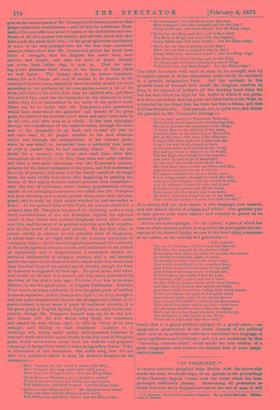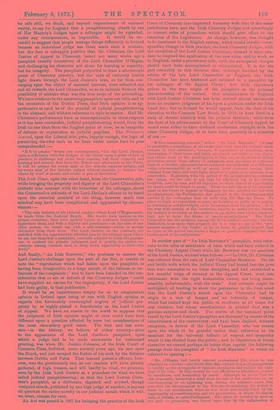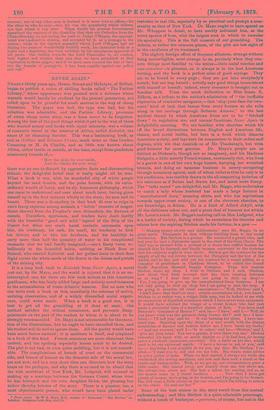"IN CHANCERY."*
A CHARACTERISTIC pamphlet from Dublin with the above title marks the close, we should hope, of an episode in the proceedings of the Chancery Appeal Courts over the water which has -been prolonged sufficiently already. Renouncing all pretension to. thank God that we in England are not as the rest of meant will = in Chancery: the Lvrd Chief Justice's Pamphlet. 'ByAii TrialtSwelleter. 1Yeblin John F. Fowler. te safe still, we think, and beyond impeachment of national vanity, to say for England that a pamphleteering attack by one of Her Majesty's Judges upon a colleague might be regarded, under any circumstances, as impossible. It would be un- candid to suggest that people manage things differently in Ireland because an individual judge has there made such a mistake, but the fact is unhappily positive that Mr. Christian, the Lord Justice of Appeal in Chancery, issued not many weeks ago a pamphlet broadly accusatory of the ,Lord Chancellor O'Hagan, and challenging his character not alone for learning or capacity, but for integrity. The pamphlet purported to treat a microscopic point of Chancery practice, but the rays of curiously hostile light drawn through the Lord Justice's lens, so far from con- verging upon the object of assumed interest, were refracted one and all towards the Lord Chancellor, so as to indicate without the possibility of mistake what was the true scope of the proceeding. We have evidence in the answering pamphlets upon our table and in -the oomments of the Dublin Press, that Irish opinion is as ap- prehensive as need be of the scandal of judicial pamphleteering in the abstract, and without reference to style or matter. Had Mr. Christian's performance been as unexceptionable in these respects as it has been censurable, judicial pamphleteering would, from the Irish no leas than from the English point of view, be as incapable of defence or explanation as judicial pugilism. The Freeman's Journal, upon the Liberal side, puts, happily enough, the logic of permitting disorder such as we have under notice here to pass unreprehended "If it be properrvrrites our contemporary, "for the Lord Justice, upon a difference with the Judges of his Court upon a point of law or practice, to challenge not alone their reasons, but their capacity and learning and honour, first from the Bench and afterwards in the Press, it will be proper for every man of the sixteen superior judges, and for every man of the inferior judges without number, to defame the
• others by word of mouth and stroke of pen at discretion."
The Irish Times, upon the other hand, from the Conservative aide, while bringing the propriety and dignity of the Lord Chancellor's attitude into contrast with the behaviour of his colleague, shows the Conservative estimate of the Lord Justice's offence to be based upon the essential mischief of the thing, however much that 'mischief may have been complicated and aggravated by circum- stances :—
"The only defence of his judicial conduct which Lord O'Hagan made, be made from the Judicial Bench. His words were spoken on the proper occasions; they were spoken before an audience competent to :appreciate them, and with a dignity and gentleness—in the case of any other person, we would say with a self-restraint—which in nowise detracted from their force. The Lord Justice, on the contrary, not satisfied with the opportunities afforded him by the tribunal upon which he sat, has launched a pamphlet, carefully adapted to tickle the popular ear, to mislead the popular judgment, and to gratify the desire, too common among common men, to drag down superiority to their own And finally, " An Irish Barrister," who professes to answer the Lord Justice's challenge upon the part of the Bar, is careful to note the "reprobation which had fallen upon the pamphlet, as having.been irrespective, to a large extent, of the fairness or un- fairness of the complaints ;" and to have been founded on the con- sideration that no act or default of the Chancery Judges "could have supplied an excuse for the impropriety, if the Lord Justice had been guilty, in that publication."
It would be an impertinence simply for us to congratulate opinion in Ireland upon being at one with English opinion as regards this fortunately unexampled neglect of judicial pro- priety by so highly-placed a functionary as the Lord Justice of Appeal. We have no reason in the world to suppose that the judgment of Trish opinion might or ever could have been different upon a question affected by none but considerations of the moat elementary good sense. The first and last occa- -sion—in the history, we believe, of either country—prior -to the appearance of the Lord Justice's pamphlet, upon 'which a judge had to be made answerable for unlicensed printing, was when Mr. Justice Johnson, of the Irish Court of Common Pleas, forfeited, some seventy years ago, his seat upon the Bench, and just escaped the forfeit of his neck by the distance between Dublin and Paris. That learned person's offence, how- ever, was the gentlemanly one, as our readers will have already gathered, of high treason, and will hardly be cited, we presume, even by the Irish Lord Justice as a precedent for what we have called judicial pamphleteering ; so that the Lord Justice Chris- tian's pamphlet, as a deliberate, digested, and avowed, though unsigned attack, published by one high judge of another, is beyond all question the entire novelty in our judicial annals which it will, • we trust, remain, for ever.
An Act was passed in 1867 for bringing the practice of the Irish
Court of Chancery into improved harmony with that of the sister jurisdiction here, and the Irish Chancery Judges met accordingly to concert rules of procedure which should give effect to the intention of the Legislature. As change, however, was thought to be imminent in the English system, which would involve corre- sponding change in Irish practice, the Irish Chancery Judges, with the exception of the Lord Justice Christian, deemed it more pru- dent to suspend the application of the new rules, and to work, as in England, under a provisional code, until the anticipated changes should have been accomplished or relinquished. It is for his part ostensibly in this decision that, although fortified by the advice of the late Lord Chancellor of England, the Irish Chancellor has been traduced and satirised in a pamphlet by his colleague of the Appeal Court ; but Irish experience points to the true origin of the pamphlet in the personal characteristics of the author. Our acquaintance in England with Lord Justice Christian has been derived almost exclusively from an eccentric judgment of his upon a question under the Irish Land Act ; but in Ireland he would appear, from the date of his elevation to the Common Law Bench in 1858, to have lived in a state of chronic hostility with his judicial brethren ; while from the date of his advancement to the Court of Chancery Appeal he would seem either to have declined conference outright with the other Chancery Judges, or to have been generally in a minority of one :— " Before examining censure," writes "An Irish Barrister," "it meg be profitable—sometimes, at all events—to look into the censor's ante- cedents in that character ; because, if austerities of criticism, upon observation of their tenor and habit, are found referable to the diges- tion rather than to the intelligence, if they are to be deemed biliary secretions rather than efforts of judgment, and are more of a disease than of a faculty, appreciations so rendered are evidently of a different value, circumstantial as well as moral, from censures hawing their warrant from duty, and their light, whether to guide or to mislead, from conscience. Beginning with the period of his incumbency as common- law judge, we are safe to say that he affronted ton of his eleven brethren, man by man, and all together, as often almost as opportunity for insult could be found or made. From the date again of his appoint- ment to the Court of Appeal in Chancery, ho has assailed the law that he administers, the Parliaments that passed it. the Governments that carried it, the colleagues that sit with him, the Bar, the Press. No place so high, no reputation so pure' no faculties so noble or so gentle, no learning so acknowledged, as to be exempt from his attacks. As is the way with certain of the carnivore, known to make for the throat, his instinct is to fasten on the motive, so as, in his own choice phraseo- logy, not to incur the blame of mealy-nionthedness." The Lord Chancellor has the primacy among the Lord Justice's hatreds ; but the distinction is no more than primacy, for it is tree to say of the 'per- manent member of the Court,' as he so loves to qualify himself, that no cynic of the period has drawn a larger or goodlier company into the brotherhood of his antipathies."
In another part of "An Irish Barrister's" pamphlet, with refer- ence to the calm or semblance of calm which had been noticed in the Chancery Appeal Court while Mr. Brewster was the associate of the Lord Justice, we read what follows :—" In 1868, Mr. Christian was relieved from the rule of Lord Chancellor Brewster. The bit and bridle with which the judicial Rarey had bound fast the jaws that were amenable to no other discipline, and had established a few months' reign of decency in the Appeal Court, went into retirement with the right honourable owner, not being trans- missible, unfortunately, with the seals." And extracts might be multiplied, all tending to show the persuasion in the Irish mind that the Lord Justice's attack upon the Chancellor had ita origin in a vice of temper and an infirmity of tongue, which had indeed kept the public in readiness at all times for oral violence, but whose manifestation in printed libel was a genuine surprise and shock. The merits of the technical point raised by the Lord Justice's pamphlet are discussed by several of the intervenieuts of the controversy, and have been decided, without exception, in favour of the Lord Chancellor, who has reason upon the whole to be grateful rather than otherwise to his assailant for the universal tribute of respect and sympathy which it has elicited from the public ; and in illustration of whose character we cannot perhaps do better than reprint the following passage from the pamphlet of "An Irish Barrister" to which we referred in opening Mr. O'Hagan had barely entered professional life, when he was admitted to a society—the North-East Bar—which it is no disparagement to qualify as the stronghold of opinions in religion and politics the anti- type of his own. In that society he won affection by kindliness, respect by manliness, and leadership by merit. Although he never, that we can remember, borrowed a week from the toil of the profession, for an electioneering or an agitating tour, during the nineteen years that preceded his advancement to the Solicitor-Generalship, the period is fresh in our recollection when he was beset, and vainly beset, by the importunity of constituencies, and the persecution, it might be almost said, of friends, to enter Parliament. The place so coveted by most as the path to promotion, was forced upon him by the culmination of:
success; nor of any other man in Ireland is it more true to affirm—let the other be Who he may—that his was the popularity which follows, not that which is run after. When finally the present Government signalized the removal of the disability that shut out Catholics from the Chancellorship, by entrusting the seals to Judge O'Hagan, the appoint- ment was tendered to opinion, and accepted by it, as a homage to the nation ; while in the exalted assembly where Lord O'Hagan had sat during two years of wonderfully fruitful work, his character both as a legist and a legislator, has been certified by thr unanimous approval of his peers. Our feeling towards the Lord Chancellor is, we confess, both higher and warmer than any that we have permitted to find expression in these pages ; and if we have once crossed the line of fact, into the domain of panegyric, it has been equally against our policy and will."




































 Previous page
Previous page